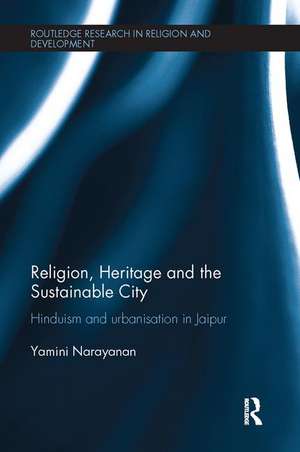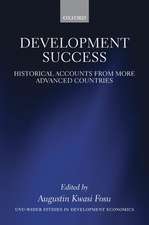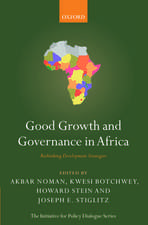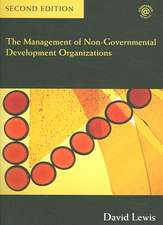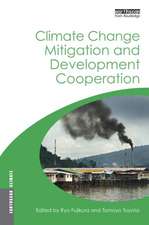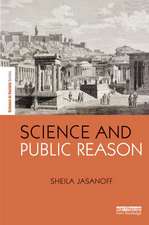Religion, Heritage and the Sustainable City: Hinduism and urbanisation in Jaipur: Routledge Research in Religion and Development
Autor Yamini Narayananen Limba Engleză Paperback – 11 apr 2017
This book explores the historical and on-going influence of religion on urban planning, design, space utilisation, urban identities and communities. It argues that the conceptual and empirical approaches to planning sustainable cities in India need to be developed out of analytical concepts that define local sense of place and identity. Examining how Hindu religious heritage, beliefs and religiously influenced planning practices have impacted on sustainable urbanisation development in Jaipur and Indian cities in general, the book identifies the challenges and opportunities that ritualistic and belief resources pose for sustainability. It focuses on three key aspects: spatial segregation and ghettoisation; gender-inclusive urban development; and the nexus between religion, nature and urban development.
This cutting-edge book is one of the first case studies linking Hindu religion, heritage, urban development, women and the environment in a way that responds to the realities of Indian cities. It opens up discussion on the nexus of religion and development, drawing out insightful policy implications for the sustainable urban planning of many cities in India and elsewhere in South Asia and the developing world.
| Toate formatele și edițiile | Preț | Express |
|---|---|---|
| Paperback (1) | 272.50 lei 6-8 săpt. | |
| Taylor & Francis – 11 apr 2017 | 272.50 lei 6-8 săpt. | |
| Hardback (1) | 820.64 lei 6-8 săpt. | |
| Taylor & Francis – 10 oct 2014 | 820.64 lei 6-8 săpt. |
Din seria Routledge Research in Religion and Development
-
 Preț: 326.49 lei
Preț: 326.49 lei - 16%
 Preț: 274.46 lei
Preț: 274.46 lei -
 Preț: 416.22 lei
Preț: 416.22 lei -
 Preț: 449.41 lei
Preț: 449.41 lei - 18%
 Preț: 997.90 lei
Preț: 997.90 lei - 19%
 Preț: 270.82 lei
Preț: 270.82 lei -
 Preț: 356.44 lei
Preț: 356.44 lei -
 Preț: 380.25 lei
Preț: 380.25 lei - 18%
 Preț: 1009.91 lei
Preț: 1009.91 lei -
 Preț: 391.61 lei
Preț: 391.61 lei -
 Preț: 382.36 lei
Preț: 382.36 lei -
 Preț: 186.32 lei
Preț: 186.32 lei -
 Preț: 385.62 lei
Preț: 385.62 lei -
 Preț: 186.36 lei
Preț: 186.36 lei -
 Preț: 387.20 lei
Preț: 387.20 lei -
 Preț: 198.45 lei
Preț: 198.45 lei -
 Preț: 389.66 lei
Preț: 389.66 lei -
 Preț: 386.22 lei
Preț: 386.22 lei -
 Preț: 172.00 lei
Preț: 172.00 lei -
 Preț: 384.86 lei
Preț: 384.86 lei - 18%
 Preț: 945.36 lei
Preț: 945.36 lei - 18%
 Preț: 999.51 lei
Preț: 999.51 lei - 18%
 Preț: 1059.62 lei
Preț: 1059.62 lei
Preț: 272.50 lei
Preț vechi: 334.03 lei
-18% Nou
Puncte Express: 409
Preț estimativ în valută:
52.15€ • 54.24$ • 43.05£
52.15€ • 54.24$ • 43.05£
Carte tipărită la comandă
Livrare economică 14-28 aprilie
Preluare comenzi: 021 569.72.76
Specificații
ISBN-13: 9781138056947
ISBN-10: 1138056944
Pagini: 256
Dimensiuni: 156 x 234 mm
Greutate: 0.45 kg
Ediția:1
Editura: Taylor & Francis
Colecția Routledge
Seria Routledge Research in Religion and Development
Locul publicării:Oxford, United Kingdom
ISBN-10: 1138056944
Pagini: 256
Dimensiuni: 156 x 234 mm
Greutate: 0.45 kg
Ediția:1
Editura: Taylor & Francis
Colecția Routledge
Seria Routledge Research in Religion and Development
Locul publicării:Oxford, United Kingdom
Public țintă
PostgraduateCuprins
Foreword by Clara Greed 1. Prologue 2. Introduction: Religion, Heritage and the City 3. Sustainable cities as a planning paradigm in India: case for religion 4. Religion and Heritage in India's Old Cities: Renewal for Sustainable Development 5. Hinduism and Heritage: Conceptual Frameworks for City Planning 6. Hinduism, heritage and sustainable development in Jaipur 7. Hinduism and Space: Place and Identity in Old Jaipur 8. Women's right to the city: integrating religion and heritage 9. Religion, Nature and Urban Development in Jaipur 10. Quo vadis, India? Where next for urban policy?
Recenzii
"This is a valuable contribution to the geographies of religion and cultural geographies canon, offering as it does the first serious consideration of how the material practices and imaginaries of Hinduism shape urban forms in a South Asian city. It convincingly proposes that religion, with its focus on place-making and fostering spaces of public heritage, is the key to reconceptualising what sustainable development means within rapidly urbanising societies like India."
Chris Baker, University of Chester, UK
"This book brings to the forefront the issues that are at stake in ignoring religion and religious cultural practices in how a city is allowed to develop. It shows that only when one understands, respects and nurtures the religious aspects of a city’s culture and traditions, its spiritual roots, can the city develop in a truly sustainable way."
Jeff Kenworthy, Curtin University, Australia
"This fascinating book pivots around the important concepts of religion and heritage to help expand our thinking on urban development in India today. By foregrounding culture in debates on planning and sustainability, Narayanan offers a fresh and highly timely analytical departure for the study of cities in India, Asia and beyond. This ambitious text promises to make a significant contribution to the fields of urban studies, sustainable development, and religious and heritage studies."
Tim Winter, Deakin University, Australia
Chris Baker, University of Chester, UK
"This book brings to the forefront the issues that are at stake in ignoring religion and religious cultural practices in how a city is allowed to develop. It shows that only when one understands, respects and nurtures the religious aspects of a city’s culture and traditions, its spiritual roots, can the city develop in a truly sustainable way."
Jeff Kenworthy, Curtin University, Australia
"This fascinating book pivots around the important concepts of religion and heritage to help expand our thinking on urban development in India today. By foregrounding culture in debates on planning and sustainability, Narayanan offers a fresh and highly timely analytical departure for the study of cities in India, Asia and beyond. This ambitious text promises to make a significant contribution to the fields of urban studies, sustainable development, and religious and heritage studies."
Tim Winter, Deakin University, Australia
Descriere
Religion has an important role to play in defining sustainable urban development policies in cities. This book explores the historical and ongoing influence of religion on urban planning, design, space utilisation, and the creation and impact on urban identities and communities. Specifically, the book explores how religious heritage, religious beliefs and religiously influenced planning practices have influenced different facets of development in Indian cities.
